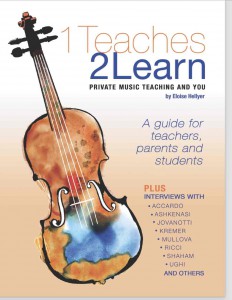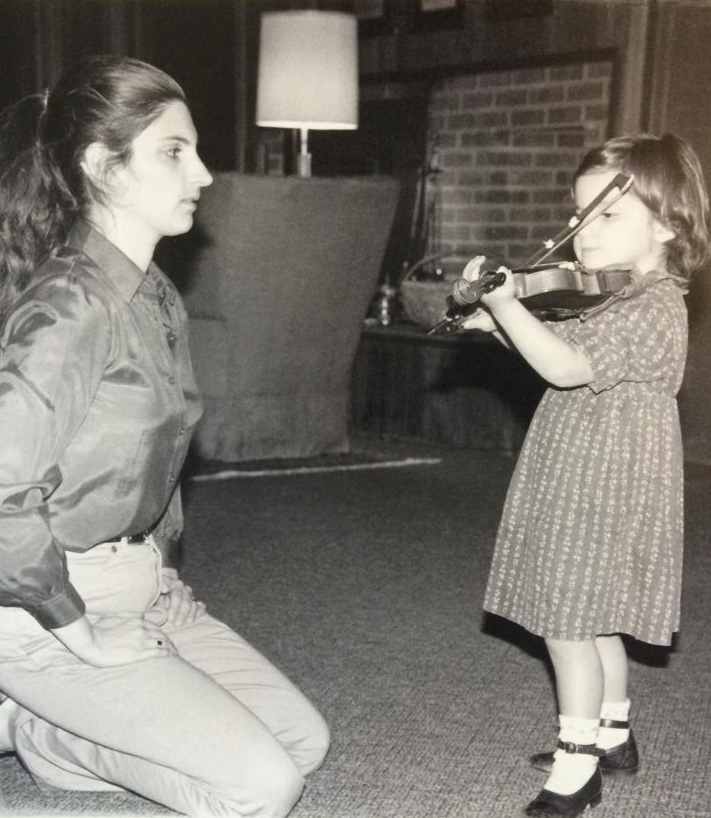Jumping the Gun…
“I’m a Suzuki teacher and have been teaching my own son for the last three months. He is so anxious to go ahead with his songs and goes so fast that I am afraid that his technique can’t keep up.. In fact, his technique is not great, and I wonder if allowing him to go at the pace at which he can learn notes is going to erode it. He’s moving way faster than I have my 4-5 yr old students learn because of these circumstances. What to do?”
What to do, indeed. What happens when you get such a motivated, talented and powerful child?
Been there, done that! Circumstances (living in remote places) forced me to teach my own two children for many years before passing them on to other teachers so I can definitely identify with this young teacher’s/mother’s angst. I can also identify with her as I have had my fair share of precocious/prodigious/difficult students over my rather long career.
The beauty of having experience is you learn to have a very long view of things. Experience makes you realize that in the long run, some things that seem so important now may not be as important as you think in that particular moment. Why? Because your nose is so close the canvas, i.e., your student, that you can lose sight of the big picture and get bogged down in details, to the detriment of your students.
So my answer is as follows:
You have a very talented, if not gifted child. You can blame it on DNA, Suzuki, hearing you teach, whatever, but the fact is that he obviously loves the violin and wants to go on. Your problem is, like with most gifted/precocious kids, his intellectual age is one, his emotional age is another and his physical age yet another. You also have a child with a very strong personality which he will no doubt find useful in life but doesn’t make it any easier at the moment for you, his teacher/parent.
What to do? The choices are several but may not get the results you want – or at least want in this moment.
- You can insist on perfect technique and bore him to death (and he will stop cooperating),
- You can let him go ahead as he pleases,
- You can find some kind of compromise.
The first two choices can cause anguish (Oh my, oh my, am I doing the right thing???) for you as teacher and/or a mother. So let’s talk about compromise. What does that mean? It doesn’t mean finding a compromise with your student – with some young children that just isn’t possible. It means making one with yourself. So, first of all, decide if you are going to do
- What is best for the child in that moment and in the long run,
- What is best for your teaching method,
- Or what is best for the violin.
If you pick one of the second two, then you’re not making a compromise. The compromise comes when you alter your teaching techniques and even principles to fit the student you have in front of you. Most students don’t send us into this territory, but get a highly motivated, talented, precocious, strong-willed young child and there you are – in the forest with no compass and grizzly bears everywhere. The only choice is not to panic and adjust yourself, your teaching and your attitudes to the circumstances – or risk losing one for music.
I once had a super precocious two and a half year old student who had taught himself to read at that age. He was also extremely strong-willed and manipulative (yes, even at 2 years old). While I insisted on class discipline and good manners, I had no choice but to let him go ahead with his pieces as he pleased, i.e., as soon as he learned one song to his satisfaction, notwithstanding his atrocious technique (he was also left handed) until he was about seven. They say seven is the age of reason and they’re right. At that point his various ages mostly caught up with him and I could reason with him, so we went back and fixed his technique. Yes, we spent a year doing it, but better lose a year than a student lose interest and quit. Yes, it was painful for me to teach this way, but causing this boy to quit by boring him to death was not an option.
My older daughter was like this: she could hold the violin or bow any old way she wanted and still get results that pleased her. She, too, was very talented. It took me ages to get her to do certain things right. It isn’t that she didn’t obey, but that as things went well for her anyway (so she thought), proper technique slipped – she just forgot. She is now a fine violinist, perfect technique and has an MM in violin performance. The trick with her, also another strong personality, was to wait until she had enough years on the instrument so her level of consciousness was raised enough that she could hear that when she did do things with the proper technique, it sounded better. While this is possible even with four year olds, it’s not easy as everything is still so physically difficult for them and they don’t yet have high aspirations for their sound and phrasing. They’re mostly just happy to get the notes out: it’s still an intellectual exercise for them. When they’re older, they have mastered a fair amount of technique, hopefully acquired a bit of musical taste, consciously understand the difference between playing notes and making music, they then can be brought to awareness of where their technique is lacking so they can fix it. This may take a long time, so you must grit your teeth and tolerate certain technical lapses that you wouldn’t from other easier to handle students. The long view, remember?
I had another highly precocious student whom I couldn’t get to bend his thumb on the bow. According to him things went well anyway. In desperation I sent him to study also with a famous virtuoso (with enormous personality and charisma) who took ONE SOLID YEAR to
convince this kid to bend his thumb. Where is this child now? He is the concertmaster and soloist in a German orchestra, Herr Professor in the university (in his early thirties) and is becoming a conductor. So although it certainly would have been better if he had done so from the start, it really wasn’t so important in the long run if he bent his thumb at 4 years of age or at 9. The point is that we got through to him eventually and his career certainly didn’t suffer. This doesn’t mean we shouldn’t try to instill proper technique in our students (I never gave up on that thumb until I had to finally call in “The Marines.”), but we must realize that we can’t always have things the way we want them, how we were taught to have them in didactics class, how they just generally ought to be and when we think it’s appropriate.
With highly talented and motivated students, all bets are often off and you have to really dance with them and give them what they need in that moment. I worried about my children and other students just as you do, but I have learned from long experience to relax and keep my eye on the important thing: keep’em playing while giving them as much technique as I can without making them feel stuck in the mud. To do this means you may well have to modify your teaching values somewhat. But that’s what teaching really is about anyway, isn’t it? Give the student what he needs, not what you need to give him. You’re going to have to teach your little boy differently from how you teach others. His technique will catch up when it becomes important to him to sound really good. Of course, you’ll keep after him anyway in the meantime, but he will realize eventually that to make music, he must have the means to do it. Four year olds, especially the precocious and stubborn ones often, in my experience, have trouble wrapping their minds around this.
So don’t worry if things aren’t perfect. Don’t worry about what the other parents in group lesson think because your child’s not doing what the other children are or how they’re doing it. Probably no one will take much notice anyway. You want your child enthusiastic and playing. Yes, you can insist on some things but you must carefully find a balance, the line you must not cross in order not to stifle that wonderful and rare enthusiasm.
It’s students like this that make us call into question just about everything which, again in the long run, is good for us and will make us better teachers not only for gifted students but for all the rest of them, too. You may feel slightly out of control as you play catch-up, running breathlessly after your child/student, but learning that sometimes letting go of total control and putting aside certain principles that they ingrained in us in our own training, may give us more control of the results in the long run when we can reason with our charges. At least they’re still playing!
We have to have the long view of winning a war. To win that war, you may have to cede a battle or two. Or three. Or four. So to help you gird your loins, here’s the mantra that I recite to myself in times of utter exasperation:
“I’m bigger, I’m more educated, I’m smarter (well maybe not, but it helps to think I can still outwit a 4 year old) and it’ll all be okay.”
And so far, it always has.
Post author: Eloise Hellyer
Share this:
Buy it on www.sharmusic.com - eBook format, avaliable worldwide, paperback in North America
COPYRIGHT
ABOUT
A music teacher’s thoughts and observations on the teaching and the study of a musical instrument, hoping to be of help to parents, students and teachers.
PHOTO
AWARDED TOP 25 VIOLIN BLOG
CATEGORIES
TAGS
ARCHIVES
-
Agosto 2022
Agosto 2023
Agosto 2024
April 2015
April 2016
April 2017
April 2019
April 2020
Aprile 2022
Aprile 2023
Aprile 2024
August 2014
August 2015
August 2016
August 2017
August 2018
August 2019
August 2021
December 2014
December 2015
December 2016
December 2017
December 2018
December 2019
December 2020
Dicembre 2022
Dicembre 2023
Dicembre 2024
Febbraio 2022
Febbraio 2023
Febbraio 2024
February 2015
February 2016
February 2018
February 2019
February 2020
February 2021
Gennaio 2022
Gennaio 2023
Gennaio 2024
Giugno 2022
Giugno 2022
Giugno 2023
Giugno 2024
January 2015
January 2016
January 2017
January 2018
January 2019
January 2020
July 2015
July 2017
July 2019
June 2016
June 2017
June 2018
June 2019
June 2020
June 2021
Luglio 2022
Luglio 2023
Luglio 2024
Maggio 2022
Maggio 2023
Maggio 2024
March 2015
March 2016
March 2017
March 2018
March 2019
March 2020
March 2021
Marzo 2022
Marzo 2023
Marzo 2024
May 2015
May 2016
May 2018
May 2019
May 2020
November 2014
November 2015
November 2016
November 2017
November 2018
November 2019
November 2021
Novembre 2022
Novembre 2023
Novembre 2024
October 2014
October 2015
October 2017
October 2018
October 2019
October 2020
October 2021
Ottobre 2022
Ottobre 2023
Ottobre 2024
September 2014
September 2015
September 2016
September 2018
September 2019
September 2020
September 2021
Settembre 2022
Settembre 2023
Settembre 2024
RECENT POSTS
Terry G and Me, or Terry Gilliam on Where (or What) Practicing the Piano Will Get You…
The Teaching We Don’t Do Is More Important Than We Think
Overwhelmingness or What Teaching and Motherhood* Have in Common
Cellphone Serenity
How to Build Your Reputation – the Kind You Want
Desperate Times, Desperate Measures. Or How to Deal With Your Strong-Willed Stubborn Student and Survive
“Why Does My Teacher Get So Frustrated?” Letter to a Perplexed Student
Mount Rush-no-more….And How to Get There
Realizzato con VelociBuilder - Another Project By: Marketing:Start! - Privacy Policy




